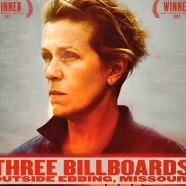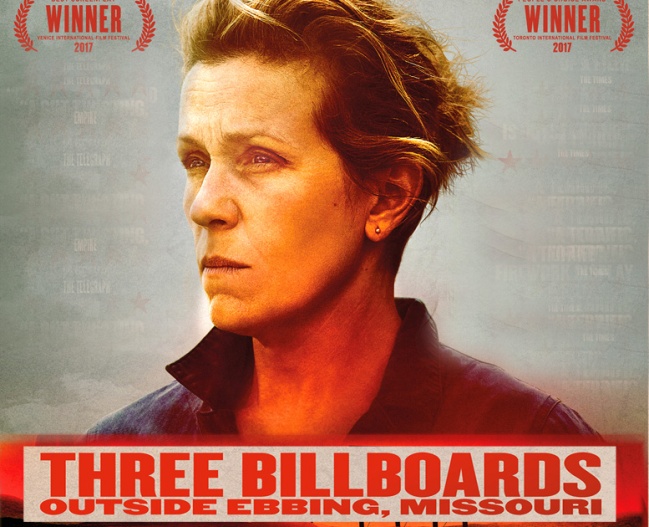 December
17
December
17
Tags
Three Billboards outside Ebbing, Missouri (2017)

If it were possible to name the dominant emotion swirling around the world today it would be anger. Its many causes include social inequality, political instability, and global brinkmanship, all of which create a collective sense of helplessness due to events and systems over which we have no control. Any film that gives expression to this anger is cathartic, and Three Billboards Outside Ebbing, Missouri (2017) hits this mark right from the outset.
Seven months after the rape and murder of Angela Hayes, her mother Mildred (Frances McDormand) is ready to explode. Local police investigations have stalled, she is not getting any updates, and she believes that much more could be done. She rents three neglected billboards and plasters three simple messages against blood-red backgrounds: “Raped while dying”; “And still no arrests”; and “How come, Chief Willoughby?”. The shocked town is instantly divided into those sympathetic to Mildred’s plight and those supportive of terminally ill Chief Willoughby (Woody Harrelson). Police are outraged, national media get involved, and Mildred’s son and former husband try to talk her out of her protest. Events spiral out of control: there are outbursts of police racism, homophobia, bashings, arson, a suicide, as well as community outpouring of sympathy for Willoughby and blame for Mildred. Undeterred and hell bent on revenge, she sets a course into nihilism without regard for the consequences.
Not since Network (1978) when enraged Peter Finch screamed “I’m as mad as hell and I’m not going to take this anymore” has a film penetrated the global zeitgeist with such forensic accuracy. When Mildred lets loose, it feels good and right. McDormand’s powerhouse feminist performance makes this her film: no other contemporary actress does cold anger like she can and still offer a warm vulnerability to make us care. Harrelson is a complex opposite: reasonable, wounded, and compassionate. His likeability is the film’s greatest complication: while we share Mildred’s anger we also want to quarantine Willoughby, especially when we meet his beautiful wife and daughters.
Three Billboards is telling us that to feel human we sometimes must do extreme things. Whether you accept that message or not, this film offers a safety valve for anyone who feels crushed by the system. Labelling it a ‘black comedy’ is a loose fit for a film full of surprises where most of the humour is found in lightning fast one-liners laced with multiple F-bombs. The blackness lies in the moral ambiguity of Mildred’s behaviour: she is channelling eye-for-an-eye justice and it matters little if the wrong person pays. Whatever you make of it, this is a gripping film that you are unlikely to forget soon.

Director: Martin McDonagh
Stars: Frances McDormand, Woody Harrelson, Sam Rockwell

Succinct and deeply moral in tone.
I need to see it this week! Great review.
LikeLiked by 1 person
Thanks for your comment; see it soon.
LikeLike
Great post. Love Martin Mcdonagh’s works, and I’ve been hearing nothing but good things about this. Frances Mcdormand and Sam Rockwell’s performances, especially. Can’t wait to see this! 🙂
LikeLiked by 1 person
Lovely to hear from you Jade; thanks for commenting.
LikeLiked by 1 person
Sounds like a must see film…most with McDormand are.
LikeLiked by 1 person
Definitely a must-see. It is almost a portrait of America today.
LikeLike
Oh boy. Just got back from watching this film. Excellent. It will stay with me for a while. Your review is spot on. The acting is tight and tense. Spritzes of humor seemed to me more comic relief than black humor. In a film this gut wrenching, the audience needs a break now and then; the breaks were well-placed.
My only complaint….WHY, with 49 states to choose from, did they pick IDAHO for the license plate of the “bad guy?” I was in a small, art theatre with probably fewer than 10 people, but was joined in an audible groan when that license plate flashed. Perhaps it’s because the Idaho plate is distinctive. At leas that’s what I’m going to say. 😉
LikeLiked by 1 person
So glad you enjoyed it. Trust you to notice something like a license plate.
LikeLiked by 1 person
Well, I couldn’t miss that one.
LikeLiked by 1 person
My favorite film of the year so far.
LikeLiked by 1 person
It’s up there with my top faves as well Keith.
LikeLiked by 1 person
Pingback: Favourites 2017 | CineMuseFilms
This will be on my to view list.
LikeLiked by 1 person
Finally an Illawarra cinema put it on the screening list, even though it was never on the “coming soon” ads. About ten of us saw it through the week and reaction was divided. I think we were all enthralled, but some were also appalled with how far Mildred took her anger, and the violence of Dixon. (Seeing these films keeps making me nervous about an upcoming trip to the States 🙂 . It is also everything you say in this review. The script was fantastic and the wonderful cast was spot on with delivery. (although I did struggle with the Abbie Cornish role ). Conversely the Samara Weaving role was an absolute delight! Frances McDormand was a standout.
LikeLiked by 1 person
I was impressed by the vicarious ‘anger by stealth’ effect that McDormand’s role conveyed. By the end of the film, it didnt matter if she went gunning for the wrong person: she was as mad as hell and someone had to pay. This is the pent up anger that is brewing now in the States, just as you are about to step into it….praying for your return already!
LikeLiked by 1 person
Yep, totally wrong time for my first visit 🙂
LikeLiked by 1 person
BTW, the screening schedule you sent for the Illawarra Film Society sounds excellent.
LikeLiked by 1 person
Yes it does. Very eclectic. Pity I will have to miss some of those that I would most like to see.
LikeLiked by 1 person